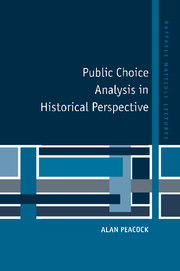Book contents
- Frontmatter
- Contents
- Preface
- PUBLIC CHOICE ANALYSIS IN HISTORICAL PERSPECTIVE
- 1 FIRST LECTURE: The Demand for Historical Perspective
- 2 SECOND LECTURE: Public Choice and the Analysis of Public Sector Growth
- 3 THIRD LECTURE: The Economic Consequences of Public Sector Growth
- 4 FOURTH LECTURE: The Calculus of Consent and Limits on Government Expenditure Growth
- 5 COMMENTARIES
- BIOGRAPHY OF ALAN PEACOCK
- Index
- RAFFAELE MATTIOLI LECTURES
2 - SECOND LECTURE: Public Choice and the Analysis of Public Sector Growth
Published online by Cambridge University Press: 04 August 2010
- Frontmatter
- Contents
- Preface
- PUBLIC CHOICE ANALYSIS IN HISTORICAL PERSPECTIVE
- 1 FIRST LECTURE: The Demand for Historical Perspective
- 2 SECOND LECTURE: Public Choice and the Analysis of Public Sector Growth
- 3 THIRD LECTURE: The Economic Consequences of Public Sector Growth
- 4 FOURTH LECTURE: The Calculus of Consent and Limits on Government Expenditure Growth
- 5 COMMENTARIES
- BIOGRAPHY OF ALAN PEACOCK
- Index
- RAFFAELE MATTIOLI LECTURES
Summary
Introduction
I wish to take as the first illustration of my theme the analysis of public sector growth which, in the course of the last twenty years, has been closely integrated with public choice analysis. But looking forward to later analysis as well as back to my basic thesis, I would like to combine my analytical with my policy interests. To repeat a quotation from Bentham which expresses my position, “it is a vain and false philosophy which conceives its dignity to be debased by use”. Whatever satisfaction is gained from the privileges and pleasures of being able to pursue academic studies, I am equally interested in finding out whether the study of the growth of government can teach us anything about the reassessment of the role of government which has occupied the attentions of policymakers in Western industrial nations for several years now.
I hope that I may be forgiven if I do not spend time on discussing such matters as the definition of government employed in studying its growth, the problems which arise in choosing appropriate indicators of growth and the presentation of the facts of growth once appropriate definitions and statistical measures have been identified. These are important preliminary matters which have exercised the skills of many analysts in what has become itself a growth industry. I shall only refer to them if they have a bearing on my general argument. Perhaps one preliminary comment on definitions may be helpful. There is a tendency in much of the analytical literature to concentrate on the public finances, particularly in analysing differences between countries.
- Type
- Chapter
- Information
- Public Choice Analysis in Historical Perspective , pp. 29 - 56Publisher: Cambridge University PressPrint publication year: 1992



